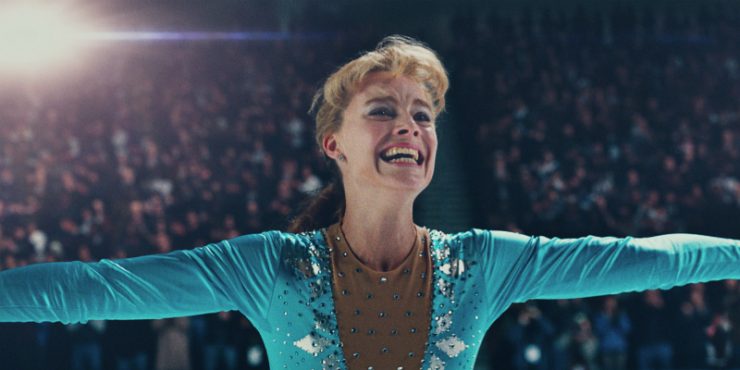Let’s start off with what works: Margot Robbie and Allison Janney are both superb. Robbie, the Australian beauty strips down her looks to play rough-around-the-edges figure skater Tonya Harding. Janney, a seasoned veteran in any role – but especially this role: the acid-tongued mother – plays LaVona Gordon, a chain-smoking waitress who trains a young Tonya from age four to be a champion. LaVona comes from the JK Simmons-Whiplash school of mentoring, where tough love and even tougher words are meant to form steel resolve under pressure; its quite debatable as to whether Tonya turns out the better for it. Robbie gives the oft-mythologized Harding real feeling, crafting a sympathetic human being where there is usually a punchline. Janney performs as if her entire career as a snappy supporting player – from The West Wing to Juno – was leading up to this. Janney will likely get an Oscar nomination, and she deserves it for, if nothing else, a brilliant film and television career. Now, let’s talk about everything else.
This is, quite frankly, one of the most unpleasant, uncomfortable films I’ve seen in a very long time. The film’s script, by Steven Rogers, is a docudrama of white trash Americana a la the 1999 film Drop Dead Gorgeous that can’t decide whether or not Harding’s plight is a joke. The film’s director, Craig Gillespie, films Rogers’ screenplay with Scorsese-light camera movement and rhythm, fully equipped with Goodfellas-type fourth wall breaking. In reality, as presented, Harding’s tale is a horror story of parental emotional assault followed by spousal physical assault, a continuing cycle of the people she loved most taking her for all she had and leaving her with nothing. When they were removed, Harding was then crucified by the media and the public following what is one of The Great Scandals of the Twentieth Century. Rogers and Gillespie really really want this story to be funny. Imagine if someone watched Big Little Lies and thought it would work great as a rollicking comedy.
The film is more full-blown biopic then I think even it wants to be. It traces Harding’s life back to her childhood, when LaVona brought her onto an ice skating rink demanding that her four-year-old daughter be allowed to participate in competitions. Skilled skating instructor, Diane Rawlinson (Julianne Nicholson), refuses to train someone so young, but Tonya proves herself on the rink, and before you know it she’s beating kids years older than her. With the training from Diane, and some fierce, sometimes violent motivation from LaVona, Tonya becomes one of the best figure skaters in the world, ready to take on the Winter Olympics in her early twenties. It’s the lead up to the ’92 Games where she meets Jeff Gillooly (Sebastian Stan), an affable dummy who blushes at Tonya’s prettiness at the start, but turns into a bully who hits her only months into their relationship. Of course, they end up married.
The movie leads you on for an hour before addressing The Incident, a calculating move that was supposed to be a psychological feat of gamesmanship but then ended with Harding’s greatest rival, Nancy Kerrigan (played here with virtually no point-of-view by Caitlin Carver), getting clubbed by a Middle American heavy and getting a broken knee cap. This is what Harding and Kerrigan will forever be remembered for. Kerrigan for her agonized cries of “WHY?!?!”, clutching her leg in the halls of her training facility. Harding for her passive participation in the act of violence. I, Tonya tries to “set the record straight” about the whole thing. Showing the true wheels of the operation being turned by Jeff and his truly, unfathomably dimwitted friend (and Tonya’s “bodyguard) Shawn Eckhardt (Paul Walter Hauser). What was meant to be a meek but shrewd attempt at psyching Kerrigan out, ended up in being the biggest sports scandal of the decade.
I, Tonya makes a mistake in thinking that Jeff and Shawn’s stupidity will be great entertainment. Both men vainly believe in their own version of the truth, and neither think very much about Tonya herself when considering their actions. These are both villains who deserve to be mocked, but I, Tonya seems to think there stupidity is their most valuable trait and not there vileness. I simply could not follow this film into the jokey realm it placed itself when dealing with these men. And that aside, I have no issues with Tonya Harding being played as an innocent, if imperfect, victim to the dealings of Jeff and Shawn – she’s been villainized enough both in and out of the sports world. But in order for I, Tonya to work, Nancy Kerrigan has to be an enigma, a completely blank representation of elitism, a much more willing victim in her own attack than Harding is in the planning of it.
That I, Tonya begins with a text which says that the film is based on “irony free” interviews of Harding and Gilooly makes it all the more a mishap. The fraud of “based on a true story” is always a tired construct to me, and I, Tonya thinks that its stylish reworking of events will be fine as long as it gives itself written permission at the start. At the end of the day, the film wants to reward Harding for everything she’s gone through, to tell her and the audience that she was just a pawn in a larger, haplessly inept scheme to undermine everything she worked tooth-and-nail to achieve. Fine. But the movie is not very interested in journalistic scruples, and it doesn’t have to be, so please spare me the Hail Mary attempt at legitimizing their version of the story. I’m reminded of Fargo, which puts up a “based on real events” scroll at the start, even though the Coen Brothers invented every detail in that screenplay – and yet, it still manages to feel more honest than I, Tonya.
Directed by Craig Gillespie










